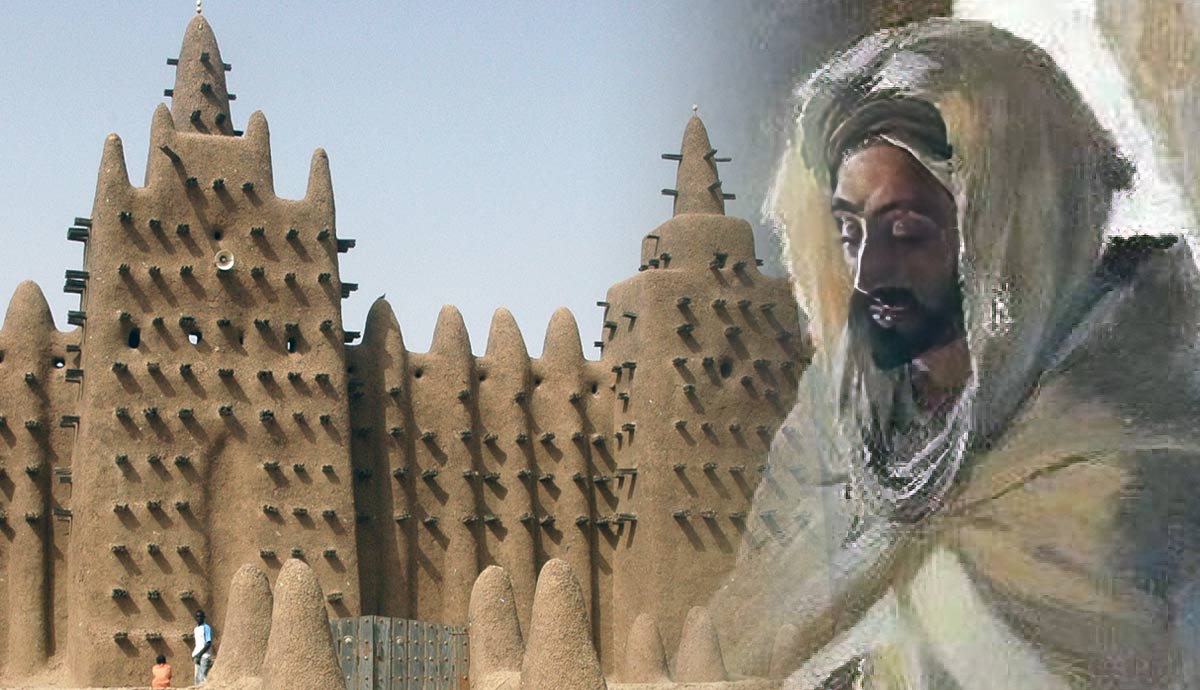
Sufism (deriving from the word ṣūf for woolen robe) is a mystical-ascetic sect of Islam, also called tasawwuf. Sufism is mystical in nature and has huge regional variation. Historically, West Africa has had a thriving Sufi culture. In this article, we explore the history and teachings of the Tijaniyya, Hamallayya, Qadiriyya, and Muridiyya Sufi orders.
What is Sufism?

Sufism was created in Persia in the 8th century CE under the influence of Neoplatonist, Jewish, and Christian mystical teachings. Its followers (Sufis) focus on inner mystical experiences and an intimate relationship between God and the human soul.
Mainstream Islam originally opposed Sufism but the scholar al-Ghazali later reconciled it with Islamic orthodoxy. The mystical path prefers intuition and inspiration over rational cognition and the love of God over the fulfillment of commandments. This path presupposes renunciation of the outside world and the passions, which can be achieved through asceticism. On the way to ecstasy, a Sufi can use the technique of repetition, by repeating a word, reading poetry, listening to music, or dancing.
According to Sufi teaching, enlightenment, the fundamental state, is a gift from God. An inexperienced student is guided on this path by a teacher. From the 8th to the 9th century, Sufism centered on the individual, only later did Sufi brotherhoods and dervish orders arise.
Sufism was divided into intellectual and popular branches. The intellectual arm (associated with Ibn Arabi, Farid, and Rumi) tends towards metaphysical or gnostic mysticism, and popular Sufism, after the 11th century, was organized into Sufi brotherhoods. In expressing the mystical experience, Sufism developed special literary genres in Arabic, Persian, and Turkish, with wine and love motifs as symbols of mystical unity.
The Tijaniyya: The Strongest Branch of Sufi Islam in Africa

Sheikh Ahmed Tijani founded the Tijaniyya Sufi order in Algeria during the 18th century. It is one of the major Sufi brotherhoods in the Islamic world, with a significant presence across West Africa, North Africa, and other parts of the Muslim world.
It emphasizes the importance of connecting with God through the recitation of specific prayers, including a set of devotional practices and supplications. The order also emphasizes the concept of seeking God’s presence in all aspects of life, both in solitary worship and through communal gatherings.
Tijaniyya followers believe that their Sheikhs have come to know the ghaib (the unknown), beginning with Sheikh Tijani, who knew the beneficial and harmful consequences of human actions. Tijani also claimed to have met the Prophet Mohammad in a material state and said that he spoke with him and learned from him the prayer: “Allah, You bless our champion Muhammad, the one who opens what is closed, and who seals what was before him, the one who helps the truth with the truth, who guides to Your right path, and bless his family.” Many beliefs are associated with this prayer.
Thus, Ahmed Tijani became the seal of the prophets among his followers and argued that whoever sees him will enter Paradise. Tijani attributed to himself the place of the Prophet on the Day of Judgment.

Sheikh Ahmed Tijani emphasized a doctrine of spiritual closeness to God and the concept of following a living spiritual guide (Murshid). The Tijaniyya order gained a following due to its accessible teachings and the emphasis on the inner spiritual journey.
Tijani was born in Algeria. He reportedly learned the Qur’an when he was seven years old. He sought knowledge, so he studied Ibn Rushd with Sheikh Mebruk Tijani. He turned to Sufism, influenced by his numerous travels, during which he met many of the representatives and leaders of Sufism, such as Tajib Lemlemi, Abu Abbas Ahmed Habibi, and Ahmed Tavash.
Throughout history, the Tijaniyya order has spread across Africa and beyond, and its followers have established numerous centers and communities. The order played a role in maintaining cultural and religious identity during colonial times and has continued to be a significant force in shaping religious and social life in many regions.

The period in which this order appeared was the period of Ottoman rule over Algeria, known for its many riots and instabilities. Under constant pressure from European countries, as well as continuous internal uprisings and unrest against the Ottomans themselves, a bad political, administrative, and social situation arose in the country.
At that time, teaching centers were reserved only for certain groups, and their number could be counted on one hand. Learning in that period was limited to the teaching of the Qur’an and certain Islamic law books. The weak economic situation made people think only about how to survive, so they had no time to engage with knowledge and learning. The Ottoman state did not attach any importance to educational institutions then.
All this led the Tijaniyya to become a leading group in Islamic education, albeit with French support. This movement started from Fez and is still spreading. Today, it has followers in the Maghrib (Morocco), Senegal, Nigeria, North Africa, Egypt, Sudan, and other places in Africa. The number of Tijani in Nigeria alone was more than ten million in 1981.
The Qadiriyya: The Equality Movement in Sufi Islam

The Qadiriyya Sufi order is one of the oldest and most widespread Sufi brotherhoods in the Islamic world. It was founded in Baghdad, Iraq by Sheikh Abdul Qadir Jilani (1077–1166), commonly referred to as “Ghous-ul-Azam” or “Al-Ghazali.”
The Qadiriyya order emphasizes the spiritual teachings of Sheikh Abdul Qadir Jilani, who advocated for a direct and personal connection with God through acts of devotion, prayer, and meditation. The order’s teachings center on the purification of the heart, seeking closeness to God, and following the path of righteousness.
One of the notable features of the Qadiriyya order is its open and inclusive approach, welcoming people from various walks of life. The order encourages its followers to engage in acts of charity, kindness, and service to others, reflecting the teachings of Sheikh Abdul Qadir Jilani on compassion and generosity. He once said: “It is an obligation for every beginner in this order to have the correct conviction and the basis, in order to be one of the disciples.”
His followers also attributed many miracles to their Sheikh. They attributed divine powers to him, considering him the creator of this world, and he is credited with being the founder of the Sufi theory of “Haqiq Muhammediyya” (“the truth about Muhammad” which interprets Muhammad as the source of everything that exists, as Allah’s light, from which the world and everything in it was made).

Throughout history, the Qadiriyya order has spread across different parts of the Muslim world, including Africa, the Middle East, South Asia, and Southeast Asia. Its followers have established spiritual centers, mosques, and institutions that contribute to their communities’ religious and social life. They have also branched out a lot, based on the following surrounding particular Sheikhs. In North Africa, the Qadiriyya order is particularly strong in Morocco.
The Qadiriyya Sufi order has played a significant role in preserving Islamic traditions and spirituality, especially during times of political change and challenges. Its emphasis is on seeking closeness to God and leading a righteous life that resonates with its followers and guides their spiritual journey.
The Muridiyya: Sufi Islam in Senegal

The Muridiyya Brotherhood, also known as the Mouride Brotherhood, is a prominent Sufi order in Senegal, West Africa. It was founded by Sheikh Amadou Bamba Mbacké (1853–1927), often referred to as Cheikh Amadou Bamba or Serigne Touba. The brotherhood’s teachings and practices are deeply rooted in Islamic spirituality as well as Senegalese culture.
The Muridiyya Brotherhood emphasizes a strong devotion to God and a close relationship with Sheikh Amadou Bamba as a spiritual guide and model. Central to the brotherhood’s teachings is the concept of hard work, humility, and service to the community. Followers of the Muridiyya order are known for their strong work ethic, discipline, and dedication to their faith.
Sheikh Amadou Bamba faced persecution from the colonial authorities due to his growing influence and the devotion of his followers. He was exiled multiple times by the French colonial administration, but his teachings and the brotherhood’s values continued to spread among the Senegalese people.
The Mouride Brotherhood also emphasizes the annual pilgrimage to the holy city of Touba, founded by Sheikh Amadou Bamba, and considered the spiritual center of the brotherhood. The Grand Magal, an annual religious event commemorating Sheikh Amadou Bamba’s exile, draws millions of followers to Touba to celebrate, pray, and reflect on their faith.
The Muridiyya Brotherhood has not only played a significant role in shaping the spiritual and cultural fabric of Senegal but it has also contributed to its social and economic development through various charitable initiatives, education, and community projects.

During the 18th century, when the French began to colonize this region, Senegalese Muslims resisted and reacted to it in various ways, especially on the periphery of the country, where resistance was strong. That is why many Senegalese joined Sufi orders, and the Tijani, in particular, gained many supporters in this way. For many, the Sufi orders represented an official structure that rejected the French authorities.
Many members of the Muridiyya were former officials who had lost their positions when the French took over and were looking for ways to regain their positions. The French persecuted these leaders because they threatened their power. This persecution of prominent Muslims only increased resistance to the French and sympathy for those who resisted them, such as Sheikh Amadou Bamba. Therefore, the order holds a central place in Senegalese society and continues to influence the lives of its followers through spiritual teachings and practical engagement.
The Hamallayya: Sufi Islam for the Impoverished

The Hamallayya order was founded by a mystic, Muhammad ben Amadu, in the early 20th century as a direct reaction against the Tijaniyya order. It spread thanks to Sheikh Hamahullah bin Muhammad bin Umar (1886-1943), who opposed the Tijaniyya hierarchy.
Their main objections against the Tijaniyya included some references to the Prophet Muhammad, the study of the Qur’an, and the performing of group prayers. Instead, Hamalliyya introduced specific Western African spiritual values of equality and suppression of any kind of hierarchy, including age, gender, and occupation.
The Hamalliyya successfully gathered together impoverished members who were involved in social protest movements in the French colonies of West Africa, especially in Mali, Mauritania, Burkina Faso, Côte d’Ivoire, and Niger. It attracted the rural poor and educated social activists.
The order was alive during French colonialism but after independence was achieved by many West African countries, it started to decline, giving spiritual territory back to the Tijaniyya. Today, it is a relatively strong spiritual brotherhood with some political connections in Mali and Niger, mostly among the Tuareg population.










